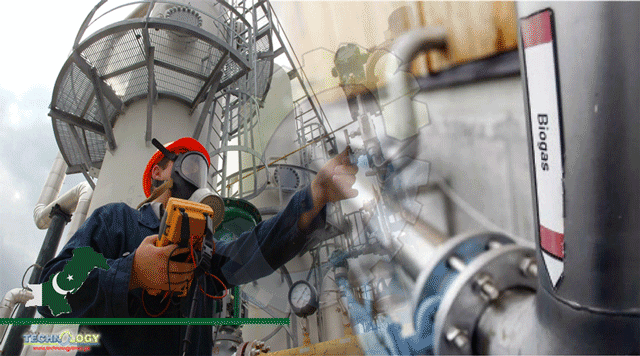Biogas typically refers to gas produced by the biological breakdown of organic matter in the absence of oxygen (anaerobic digestion).

Biogas offers highly cost-effective, renewable and decentralised energy for domestic and commercial consumers. Pakistan did try biogas production in the 1970s but it could not succeed due to the lack of user-friendly technology and awareness among communities.
Recent technological advancements in biogas digesters, especially the dome-shaped digester, have greatly helped in developing highly efficient, economically viable, environment and user-friendly biogas plants.
Dome-shaped biogas digesters are highly successfully and are developed and operated using the indigenous construction material and equipment. They are successfully being used in China and many other countries including Pakistan for biogas production using cow dung and biomass.
As of 2020, Pakistan possessed approximately 42.4 million buffaloes, 51.5 million cattle, 5.6 million donkeys, 78.2 million goats and 31.2 million sheep (Pakistan Economic Survey 2020-21).
Currently, a total of 5,357 biogas plants are installed in different areas of the country. The estimated biogas potential is about 16 million m3/ per day and 5,840 million m3 of biogas production per annum (Naqvi et al, 2018).
Therefore, Pakistan has got tremendous potential for exploiting this huge untapped renewable source of energy.
In addition, the biomass of all kinds including poultry waste, biodegradable solid and sewage waste offer much higher potential for biogas production.
Decentralised biogas energy production using animal dung is highly sustainable as it is economically viable and socially acceptable besides being environment-friendly.
A rural household possessing an average of three to four livestock heads can produce sufficient biogas for its daily energy needs besides producing decomposed organic manure as a rich source of soil fertility. Pakistan being the fifth largest livestock and dairy producing country can easily develop such simple and user-friendly technologies on a domestic and commercial scale to ensure energy security.
This can prove to be a major source of income generation in rural areas, organic farming and earning carbon credits under the Clean Development Mechanism (CDM) as the anaerobic digestion of biodegradable waste qualifies for earning carbon credits.
This intervention also helps in controlling the emission of greenhouse gases (GHG) into the atmosphere, an obligation under the Climate Change Convention and Paris Agreement.
Despite such huge untapped resources and its usefulness for energy security, the capacity and resources to harness such an enormous potential are highly limited.
Aerobic and open decomposition of organic material in landfills, waste water sewage, animal dung and all sorts of biomass release Green House Gases including methane.
As methane is a useful gas commonly used as a major source of domestic and commercial energy, it can easily be harvested through anaerobic fermentation in a biogas digester.
The recently concluded meeting of the Conference of Parties (COP26) of the United Nations Framework Convention on Climate Change (UNFCCC) held in Glasgow, the UK, the United States and the European Union, along with other partners, announced the Global Methane Pledge.
The COP26 decision included an invitation for parties to “consider further actions to reduce by 2030” other greenhouse gases, including methane.
This somewhat unexpected outcome now puts methane on the global agenda, which can not only help curb global methane emissions in an attempt to keep global warming at 1.5-degree Celsius but can also provide resources and capacity to the biogas (a major source of methane) technology development in developing countries.
Over 100 countries including Pakistan have signed the Methane Pledge, to reduce by 30% the methane emissions globally by 2030 (from 2020 levels).
This initiative offers a great opportunity to the developing countries to establish their national implementation mechanisms and ensure an enabling environment for attracting resources for this highly innovative and productive set of activities, which in itself is highly sustainable.
However, so far neither the focal ministry of the UNFCCC in Pakistan (the Ministry of Climate Change) nor the major donors of the methane pledge have taken any step forward since the adoption of the pledge at COP26.
It would be appropriate that the Ministry of Climate Change tackle this initiative at all levels, identify the stakeholders – both federal and provincial, and engage public sector, civil society and private sector stakeholders through a series of awareness and motivational workshops and seminars aimed at formulating policy, strategy and action plans.
In addition, the donors housed in Islamabad have to be approached as a follow-up to the COP26 Methane Pledge aimed at setting up a fund and developing resource flow strategies based on their eligibility criteria for field operation.
Pakistan being a non-annex1 party to the UNFCCC/ Paris Agreement can benefit in many ways from such agreed resources in not only fulfilling the international obligation under the convention but also help in fund-raising for rural development through infrastructure development for biogas digestion, income generation and labour opportunities, skill development, boosting livestock and agriculture development, gender facilitation through the provision of clean and safe energy, environmental protection, health and hygiene and replacement of fuel wood and animal dug with biogas as a clean source of energy.
This way the opportunity and interventions are highly sustainable in time and space.
This news was originally published by The Express Tribune.